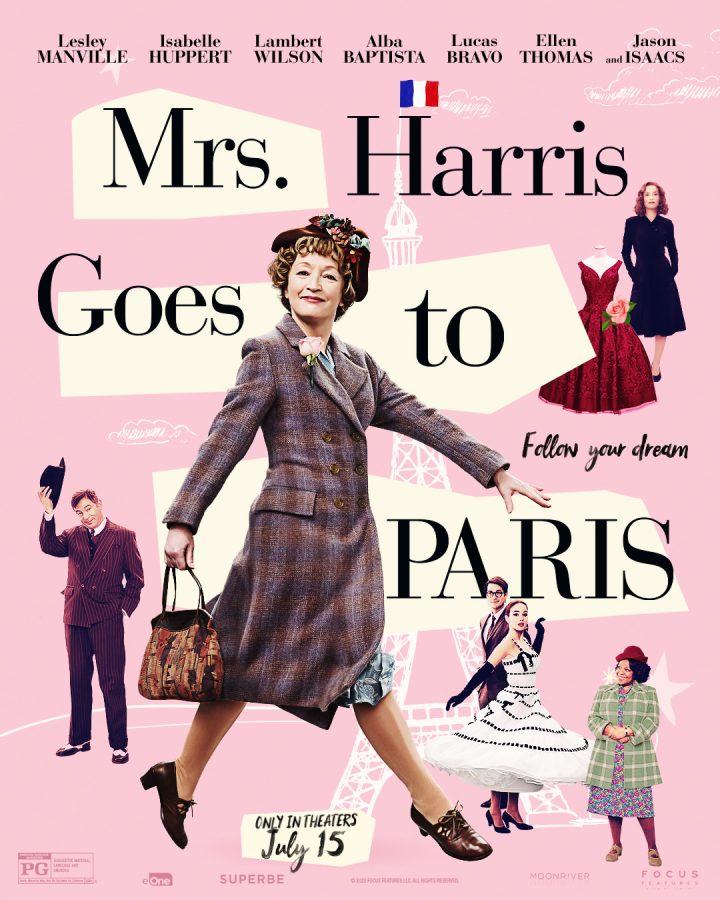“Mrs. Harris Goes to Paris,” a sickeningly sweet, low-stakes period drama from British director Anthony Fabian, somehow manages to successfully portray and celebrate a working class uprising in mid-century Europe despite its feel-good predictability.
Based on the 1958 Paul Gallico novel “Mrs. ‘Arris Goes to Paris,” the film follows Mrs. Ada Harris (Leslie Manville), a cleaning woman and WWII widow who is finally able to move beyond her trauma upon receiving confirmation of her longtime M.I.A. husband’s death. After a whimsical epiphany brought on by one of her absurdly wealthy clients’ wardrobes, Mrs. Harris decides this new chapter of her life necessitates a custom Christian Dior dress.
Upon her arrival in France, the romantic Parisian streets Mrs. Harris dreamed of are flooded with garbage in the wake of a weeks-long waste collector strike, just one indicator that things aren’t quite what dreams are made of. Though at first glance a sweet telling of a chronic optimist following her fantasy, the film (slightly) deepens with time as its characters question their roles in society and their very personhood.
Set in whimsical 1950s versions of London and Paris, the characters are adorned in lavish mid-century looks from costume designer Jenny Beavan — who won Oscars for her work on “Mad Max: Fury Road” and “Cruella” — as they galavant around, falling in love and contemplating the meaning of life.
Every little problem is overcome with help from those who surround Ada, magnetized by her homely charm, against all odds. Even Claudine Colbert (Isabelle Huppert), the initially elitist head of the label but eventual sweetheart, warms to Ada’s antics.
In fairytale fashion, the villains are revealed to be the wealthy (Dior’s most valued customer is married to the striking waste management company’s owner) and the film adapts an air of easily digestible and inoffensive revolution.
Ada quickly befriends the face of Dior, Natasha (Alba Baptista), a Hepburn-esque beauty who’s grown tired of modeling and would rather discuss heady existential philosophies than continue in a life as arm candy.
The conventionally handsome head of finances, André (Lucas Bravo), sees a new future for Dior, one that leaves upturned noses behind and brings Dior to everyone (in department stores).
Ada’s revolutionary act is … saving up the pennies she earns while meekly cleaning up after clients far wealthier than she to buy an expensive gown from one of Paris’ most exclusive designers, the epitome of higher-class overconsumption. Well, she does deserve something nice after all that work, doesn’t she?
Still, Ada takes no effort to love with her Cockney accent, quick wit and kind eyes as she talks her way into an invitation-only viewing of Dior’s latest collection, helps the fashion house seamstresses to seize the means of production and wins the affection of literally everyone around her.
Manville’s performance as Ada sells it — who could say no to such a charming, eccentric sweetie — making it easy for an audience to play along and thoroughly enjoy her journey. The world is left better in her wake, without any harsh words or bloodshed.
Though far from a scathing critique of capitalism, “Mrs. Harris” makes the topic approachable and easily understood. The heroes of “Mrs. Harris Goes to Paris” are the “invisible” workers of the world. Mrs. Harris, underpaid and unnoticed, is one of many women behind the scenes holding everything together with her bare hands.








